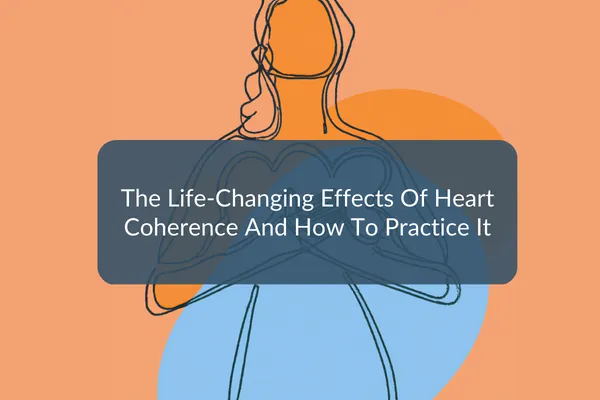
The Life-Changing Effects Of Heart Coherence
Did you know that our hearts are truly amazing and play a huge role in shaping the quality of many aspects of our lives?
Not only do they keep us physically healthy, but they also hold a special place in our culture and emotions as the symbol of love and truth. One fantastic way to boost our overall well-being and take care of our hearts is by practicing heart coherence. This involves bringing different parts of ourselves into harmony and balance.
In this post, we'll dive into the idea of heart coherence, the benefits it offers, and even teach you a technique to achieve this state. So, let's get started!
How the heart influences body and mind
The heart is a vital organ in the human body that plays a crucial role in maintaining physical and mental well-being. Often reduced to its function of pumping blood, the heart actually holds immense influence over the body and mind in various ways.
Firstly, the heart is the engine of the circulatory system, pumping blood and delivering oxygen and nutrients to almost every part of the body. A healthy heart is essential for a long and healthy life, and there are many steps that can be taken to maintain it. One of the most important is maintaining healthy blood pressure.
The heart also has an electromagnetic field that it emits with every beat, which can be detected up to 3 feet away from the body. This field is about 60 times greater in amplitude than the brain's field and it's believed that it is this electromagnetic energy that we pick up as a "vibe" or "aura" of a person.
The strength and frequency of this energy field change according to the individual's activities and emotions. When the heart rate is elevated, such as during exercise or when experiencing stress, the field is stronger. It also fluctuates according to emotions, which has a strong impact on the electromagnetic field and ultimately on the way people feel and behave around the individual.
The heart also functions as a gland. It produces hormones such as oxytocin, also known as the "love hormone," which plays a role in regulating emotions and behaviour. Oxytocin is released during activities such as labor and breastfeeding, helping to strengthen the bond between mother and baby. Additionally, it is released during intimate physical interactions, such as hugging and kissing, and can contribute to feelings of happiness and connection. The heart has long been recognized as a symbol of love and care, and it is now understood that this is due to its hormonal functions.
Additionally, it is sometimes referred to as the "mini brain" because it has its own nervous system, consisting of about 60,000 neurons, which allows it to set its own beat and patterns. The heart's nervous system also plays a role in the Autonomic Nervous System, or the "autopilot" as I call it, which controls unconscious processes like breathing and digestion. The heart communicates with the brain through the vagus nerve, and this communication is so strong that the heart communicates to the brain five times more than the brain communicates to the heart. This communication is also influenced by emotions and can affect brain function.
In conclusion, the heart is not just a simple pump, but an intricate organ that holds immense influence over the body and mind in various ways. Maintaining a healthy heart and practicing heart coherence are essential for overall well-being, physically, mentally and emotionally.
Emotions, heart and mind
The heart and brain have a complex and interconnected relationship.
The heart sends signals to the brain through the vagus nerve pathway, which can affect the brain's response to stress and emotions. The amygdala, the brain's "threat centre", which is responsible for the fight-or-flight response, is particularly sensitive to these signals.
When "negative" emotions are experienced, the brain's stress response is triggered and cognitive functions may be impaired, leading to conditions such as anxiety, depression, and insomnia.
On the other hand, when "positive" emotions are experienced, the brain's relaxation response is activated, balancing the emotional brain and cognitive functions.
Additionally, this connection between the heart and brain allows for the connection between the conscious and subconscious, giving access to memories and intuition. However, the mind also has a direct impact on the heart.
The thoughts and emotions we have can influence the autonomic nervous system, which in turn affects the function of the heart. This two-way street between the heart and brain highlights the importance of managing emotions and thoughts for overall well-being.

The 10 amazing benefits of heart coherence
Heart coherence refers to a coherent beating pattern from the heart, which is the optimum balance between the accelerator and brake of the heart. When practicing heart coherence, one can achieve a state of homeostasis, or perfect balance, physiologically, emotionally, and mentally. This state can bring many benefits to overall health and well-being. Here are 10 benefits of heart coherence:
1. Heart coherence helps to keep you healthy and social by releasing oxytocin, which protects cells, regulates inflammation, and promotes social connections.
2. Heart coherence keeps you young by boosting the release of DHEA, a hormone that is present at high levels in young people and declines with age.
3. It helps to regulate stress and its depleting effects by promoting the release of pregnenolone and reducing the release of cortisol.
4. Heart coherence lowers brain waves and enters an Alpha brain wave state, similar to meditation, which activates the prefrontal cortex, enabling better decision making, planning, and positive thinking.
5. It makes you feel happy by promoting the release of serotonin, the hormone of contentment.
6. Heart coherence improves sleep by regulating the nervous system and promoting the production of melatonin.
7. It makes you more resilient and better at regulating emotions by training both sides of the nervous system.
8. It supports the heart and cardiovascular system by regulating blood pressure and is used in hospital settings in England and France for patients recovering from cardiovascular diseases and surgeries.
9. It helps to bring harmony to the three brains: the reptilian brain, the limbic brain, and the neocortex, by giving you full access to your higher thinking functions, memories, and implicit intuition.
10. Regular heart coherence supports the immune system by promoting the production of the protein SERPIN A5, which has been shown to prevent bacterial and viral infections, inhibit cancer growth and spread, and promote tissue regeneration for Alzheimer's and Parkinson's diseases.

Practicing heart coherence can bring a sense of tranquility and well-being. It can make you feel at ease, calm and present in the moment. It can also give a sense of feeling loved and that life is in favor of you. It's like having a sense of internal happiness.
The best way to understand and experience this sensation is to practice heart coherence!
Simple heart coherence practice in 4 steps:
1. Bring your awareness to your heart- you can place your hands on your chest over your heart if it helps
2. Start breathing slower and deeper to reach your optimum rhythm (5 in 5 out or different)
3. Imagine the breath flowing in and out of your heart
4. Invite and activate a feeling of gratitude, love or care (it can help to use the vision or memory) in your heart
Keep breathing this way for 1 to 3 mins and enjoy the wonderful "internal smile" feeling!
CONCLUSION
Heart coherence is a powerful technique that can help individuals to relax, feel more positive and connect with their intuition. It is a way to reconnect with the mind-body connection that many people have lost due to busy lives and overthinking.
Furthermore, it protects overall health in various aspects, including physical, emotional, mental, and spiritual. The best part is that it is easy to practice and can be done anywhere, only taking a few minutes of time.
Hand on heart (pun intended!), I can honestly sy it has chnaged my life. I can attest to its positive impact on my physical, emotional and mental health, even during challenging times such as what we've experienced in the last few years. It has become an integral part of my life and is a cornerstone in my resilience coaching programs and trainings.
Want to reap the benefits of heart coherence for yourself? Find out more about my self-paced online course Heart Odyssey here!
Copyright ©2023 Resilience for Modern Life - Clan Wellness Ltd - All rights reserved
Tel: 01389 504 550

